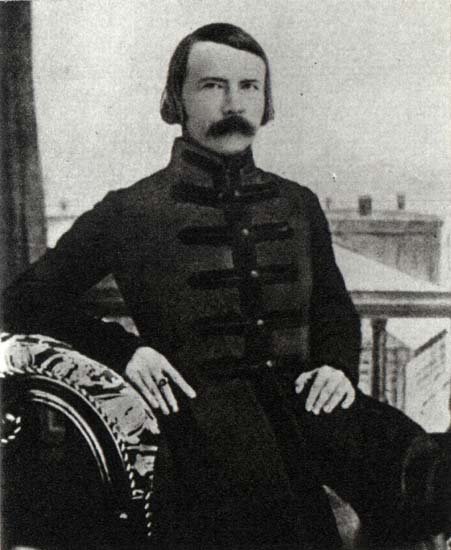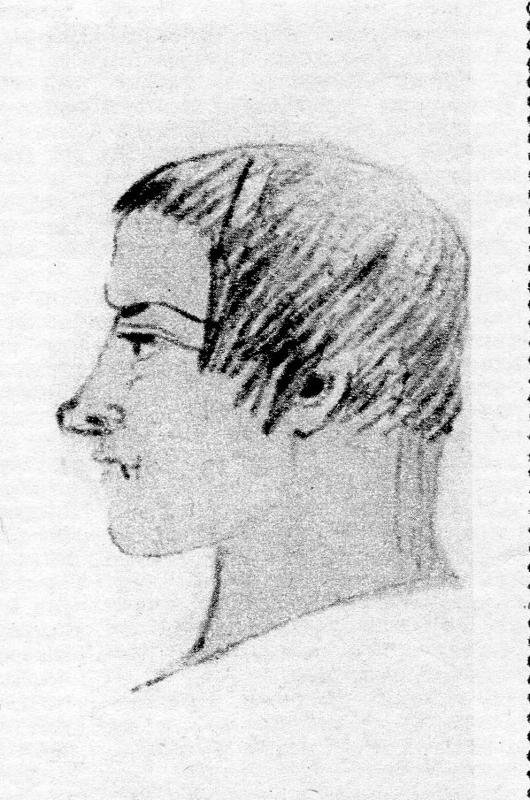Pushkin and Pyotr Kireevsky
Being in exile in the village of Mikhailovsky, Pskov province, Pushkin was inspired by wonderful folk tales and songs. The poet listened to them and recorded his nanny Arina Rodionovna, a peasant girls, and the blind beggars at the fair. So we built up a collection of forty songs. Seeing the later distortion, Pushkin's conjecture restores the lost performers the actual words of the song.
Recorded, for example, Pushkin sang the words "Song of the son Senka Razin" such lines:
He does not bow to staff officers,
The Governor will not go to trial.
And then fixed:
He sovereign's boyars not bows,
To Astrakhan Governor on trial no go.
When Pushkin returned from exile to Moscow, he was enthusiastically greeted by advanced youth. Among his ardent admirers was the son of Zhukovsky's niece - a silent, shy eighteen-year-old Peter Kireevsky.

Image with SSO license
February 23 marks the 210 anniversary of the birth (was born in 1808 in the village Dolbino, Kaluga province) Russian writer, a translator with seven languages.
This young man was destined to become a father of Russian folklore.
For months it went from the village to the village, writing down songs and attracting to itself suspicious views of the Nikolaev officials by it.
Passion Pyotr Vasilyevich Kireyevsky invested in the collection of monuments of folk poetry excited many writers who also started to record the songs of the people. Among them were poets of Languages, Koltsov, writer Veltman, later known compiler of the explanatory dictionary of Russian language of Dal, sobiratelnitsa Proverbs Professor of the Moscow University Snegirev; among them were N. Gogol.
They all gave their records to the chief custodian of this treasure of folk art - P. V. Kireevsky.
As well as Pushkin, Peter cared about saving "the old beauty and depth of feeling" old songs.
Knowing that Alexander intends to issue Russian folk songs, Kireyevsky would like to pass on to the great poet the fruits of their researches. However, Pushkin was not able to engage in the intended matter and he gave his collection of songs P. Kireevsky, on which the poet long before that said "the case is in good hands Kireevsky".
Except forty Pskov songs, in this meeting there were also Orenburg and Nizhny Novgorod songs, recorded by Pushkin in 1833, during the journey through the tracks of Pugachev.
Interested in publishing treasures of oral folk poetry, Pushkin wanted to write a Preface to the collection of songs, but this plan was not implemented. Pushkin, however, wrote a plan for the article on Russian songs, where he stayed primarily on the number of historical songs. Turning to wedding songs, he notes " * family reasons for their elegant tone".
Only in 1848 P. Kireyevsky managed to start publishing the materials at his disposal. Finished all edition "Songs collected by P. V. Kireevsky" only in the Soviet era, when it was published nearly two thousand of latest songs from the famous collection.
One of the evidence of Pushkin's friendly attitude to Peter Vasilyevich is a portrait sketch made by the poet on one of the drafts "Poltava". (The drawing is stored at the Institute of Russian literature).
I wonder what the young man could attract the attention of the poet in the autumn of 1828? It was down to the folk sessions Kireevsky, which he started in 1830-1831 years.
For the first time the name of the nineteen-year-old novice writer sounded in 1827. In the book"theMoscow Herald," which was printed Pushkin "Groom" ( "Folksy tale"), appeared the beginning of the article P. Kireevsky about the book "the Course of the latest Greek literature" writer Akovacki Rizo. Pushkin with special attention read this article about the book of man - Rizo, whom he knew personally.
"Course of Greek contemporary literature* " was devoted to the history of the liberation movement in Greece - geteria. Kireyevsky's article was actual. The Greeks, who fought for the formation of an independent state, withstood for eight months the Turkish siege of the Acropolis in Athens were forced to surrender.
The struggle of the Greek people for their national independence attracted the fervent sympathy of all advanced people. And the news of the beginning of the war between Russia and Turkey caused a huge influx of volunteers who sought to take part in the war against the oppressors of the Greek people.
Among those who filed an application for admission to the army was Pushkin, who at the beginning of the speech of the heterists, in 1821, was the most ardent advocate of this movement. But Nicholas I refused to Pushkin in his request.
And in 1829] also asked to be in the army.
In "Moscow Herald" for 1828, translated Kireevskogo appeared the first act of a Comedy of Calderon "Difficult to guard a house with two doors*". In the note, it was reported that] intends to engage in the translation of all the best works of Calderon.
Pushkin considered calderón's greatest dramatic writer and the news about the new translation of calderón made him very happy. Perhaps to this circumstance we owe the appearance of the drawing of P. V. Kireevsky.

Picture from the home archive.
Since 1837, Peter lived in his village near the Eagle, sometimes going on folk expeditions. There he died on November 6, 1856 and was buried in the Optina desert.
great post i really liked it @tata-osvyanik ... i upvote you hope you will upvote me too ♥